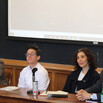Yale Law School Faculty Address Colorado Supreme Court Case
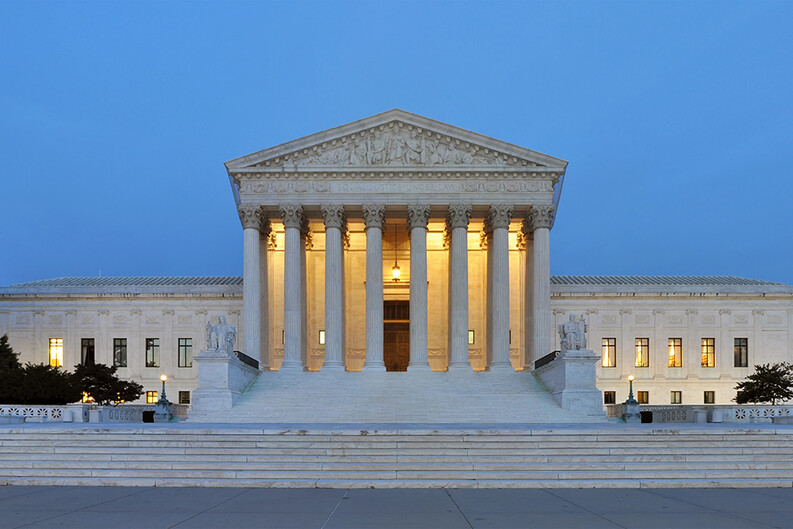
On Feb. 8, the U.S. Supreme Court will hear oral arguments in Trump v. Anderson, the case from the Colorado Supreme Court which ordered former President Donald Trump to be excluded from the state’s 2024 presidential primary ballot.
The case centers on whether Section 3 of the 14th Amendment of the U.S. Constitution disqualifies Trump from holding office. The amendment was ratified in 1868 after the end of the Civil War.
Yale Law School faculty have been called on by the media to help explain the case and have written op-eds and submitted amicus briefs to the U.S. Supreme Court. Below is a selection of those interviews and briefs.
Bruce Ackerman ’67
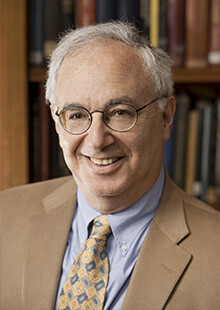
Writing in Slate this fall just before the Colorado case was decided, Sterling Professor of Law and Political Science Bruce Ackerman ’67 wrote about the urgency of deciding the case at the Supreme Court quickly given the proximity to the presidential election in November.
“The Supreme Court will confront a desperate race against time,” Ackerman wrote. “If it fails to decide the cases rapidly, it will provoke a constitutional crisis once the polls close and each state decides who won the election. Under current law, state legislatures must report their Electoral College winners in time for Vice President Kamala Harris to report the results to a joint session of Congress meeting on Jan. 6, 2025. Once she inspects the ballots, she is likely to find that none of the three candidates — neither Biden, nor Trump, nor Trump’s proxy — has won a majority of the electoral votes. At this point, Harris will confront a dilemma that will make Vice President Mike Pence’s predicament in 2021 seem modest by comparison.”
In a piece for Politico, Ackerman wrote that Trump should be removed from the ballot. “Originalism, pure and simple, serves as the foundation for Trump’s exclusion from the race,” Ackerman wrote. Such a decision would have benefits for the Court and the nation, according to Ackerman: “By affirming the Colorado decision, the Supreme Court will not only begin a long hard struggle to reconstruct its own shattered legitimacy, it will reinvigorate the democratic energies of the American people.”
Separately, Ackerman joined several other legal scholars in support of the Colorado Supreme Court decision in an amicus brief filed with the Supreme Court. Arguments to the contrary, the brief states, “fail both because they ignore Section 3’s unique constitutional status and narrow scope and because they seek unwarranted and ill-advised alterations to longstanding First Amendment doctrines.”
Read: “The Supreme Court Needs to Decide These Trump Cases ASAP to Prevent a Jan. 6 Repeat,” Slate, Nov. 13, 2023
Read: “Trump’s Supreme Court Justices Must Kick Him Off the Ballot,” Politico, Jan. 25, 2024
Read: Amicus brief to the U.S. Supreme Court by Professor Bruce Ackerman et al.
Akhil Reed Amar ’84
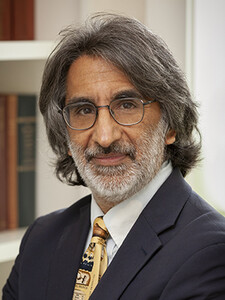
In a Feb. 7 commentary in The New York Times, Sterling Professor of Law and Political Science Akhil Reed Amar ’84 wrote that in his view, “the justices should seek a ruling that is originalist, modest and respectful of America’s democratic federalism.”
Amar writes that the Supreme Court should focus on two phrases: “the first insurrection of the 1860s” and “the 50-state solution.” Amar writes that the first explains why Trump’s conduct falls clearly under Section 3 of the 14th Amendment and the second “allows each state to use its own distinct procedures and protocols for applying Section 3.”
Amar spoke about the case before the Court and how Section 3 bars certain individuals from office at a recent event at Harvard Law School’s Rappaport Forum in January.
“If you’re ineligible to be a judge or a justice or senator or representative, or, for that matter, a dogcatcher or cabinet officer — but you can be president of the United States and that’s no problem? Jeff Davis, president of the United States, or Robert E. Lee? Seems a little odd, to put it mildly,” Amar said.
Amar and his brother Professor Vikram D. Amar ’88 of the UC Davis School of Law submitted an amicus brief to the Supreme Court in the case as well.
Read: “The Supreme Court Should Get Out of the Insurrection Business,” The New York Times, Feb. 7, 2024
Watch: HLS Rappaport Forum: Trump v. Anderson, Jan. 25, 2024
Read: Amicus brief to the U.S. Supreme Court by Professor Akhil Reed Amar and Professor Vikram D. Amar
Paul Kahn ’80
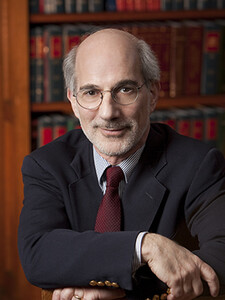
Writing in The Hill in January, Robert W. Winner Professor of Law and the Humanities Paul Kahn ’80 warned of a coming constitutional crisis in his view if the Supreme Court overturns the Colorado Supreme Court and the benefits to the country of affirming it.
“Most observers think that the Supreme Court will reverse the Colorado judicial decision disqualifying former President Donald Trump from running for president. The path of least resistance appears to be “letting the voters decide” whether Trump is fit to serve,” Kahn wrote.
“But when the high court considers the larger legal context, it may well conclude that affirming the Colorado decision is the wisest course. Reversal is not likely to leave the decision with the people, but will instead set us on a path of constitutional crisis of a magnitude not seen since the Civil War.”
Kahn continued: “A decision affirming the Colorado Court, unlike Bush v. Gore, would offer a highly plausible interpretation of the Constitution. Nor could the court be accused of partisanship in reaching this result. Indeed, if the Trump-appointed justices were to rule against him, the prestige of the court would soar. The nation might not understand the threat underlying such a decision, but most voters would welcome a return to ordinary politics. President Biden has already signaled that without Trump running, he might drop out. A new generation of political leaders could contest the office.”
Read: “The coming Trump constitutional crisis — and how to avoid it,” The Hill, Jan. 9, 2024
Samuel Moyn
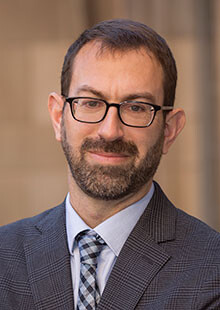
In a commentary in The New York Times in December, Chancellor Kent Professor of Law and History Samuel Moyn argued that the U.S. Supreme Court should unanimously reverse the Colorado Supreme Court decision and keep Trump — the Republican Party frontrunner for the nomination — on the ballot.
“To bar Mr. Trump from the ballot now would be the wrong way to show him to the exits of the political system, after all these years of strife,” Moyn wrote.
He continued, “The truth is that this country has to be allowed to save itself. The Supreme Court must act, but only to place the burden on Mr. Trump’s political opponents to make their case in the political arena. Not just to criticize him for his turpitude, but to argue that their own policies benefit the disaffected voters who side with a charlatan again and again.”
On the Lawfare Podcast, Moyn debated the legal questions before the Court in the case as well as the political and philosophical implications of upholding the Colorado decision and disqualifying Trump from the ballot under Section 3.
Read: “The Supreme Court Should Overturn the Colorado Ruling Unanimously,” The New York Times, Dec. 22, 2023
LISTEN: The Lawfare Podcast, Feb. 2, 2024
John Fabian Witt ’99
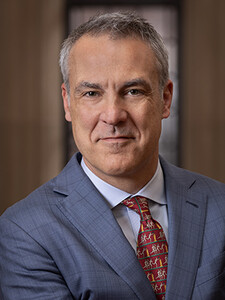
Allen H. Duffy Class of 1960 Professor of Law John Fabian Witt ’99 joined Yale history professor David Blight and Harvard professors Drew Gilpin Faust and Jill Lepore in submitting an amicus brief to the case to the Supreme Court.
The brief by the four historians provides historical support for the decision by the Colorado Supreme Court that Section 3 disqualifies Trump from holding office and therefore from appearing on the primary ballot.
Section 3 prohibits officers of the United States who have previously taken an oath to support the U.S. Constitution from holding “any office…under the United States” if they have “engaged in insurrection.”
The four historians revisit the historical origins of Section 3 during the Civil War, when “concern about Confederate sympathizers in government posts led Congress to conduct investigations, employ oaths and loyalty tests, and remove individuals from office.” They also examine the drafting and ratification of Section 3 after the Civil War and how its development “demonstrates Congress’s intent to make disqualification targeted and permanent.”
They quote Missouri Republican John B. Henderson’s declaration on the day he cast his vote for the 14th Amendment in the Senate: “The language of this section is so framed as to disenfranchise from office the leaders of the past rebellion as well as the leaders of any rebellion hereafter to come.”
Read: “Brief of Amici Curiae American Historians in Support of Respondents” by Professor John Fabian Witt
